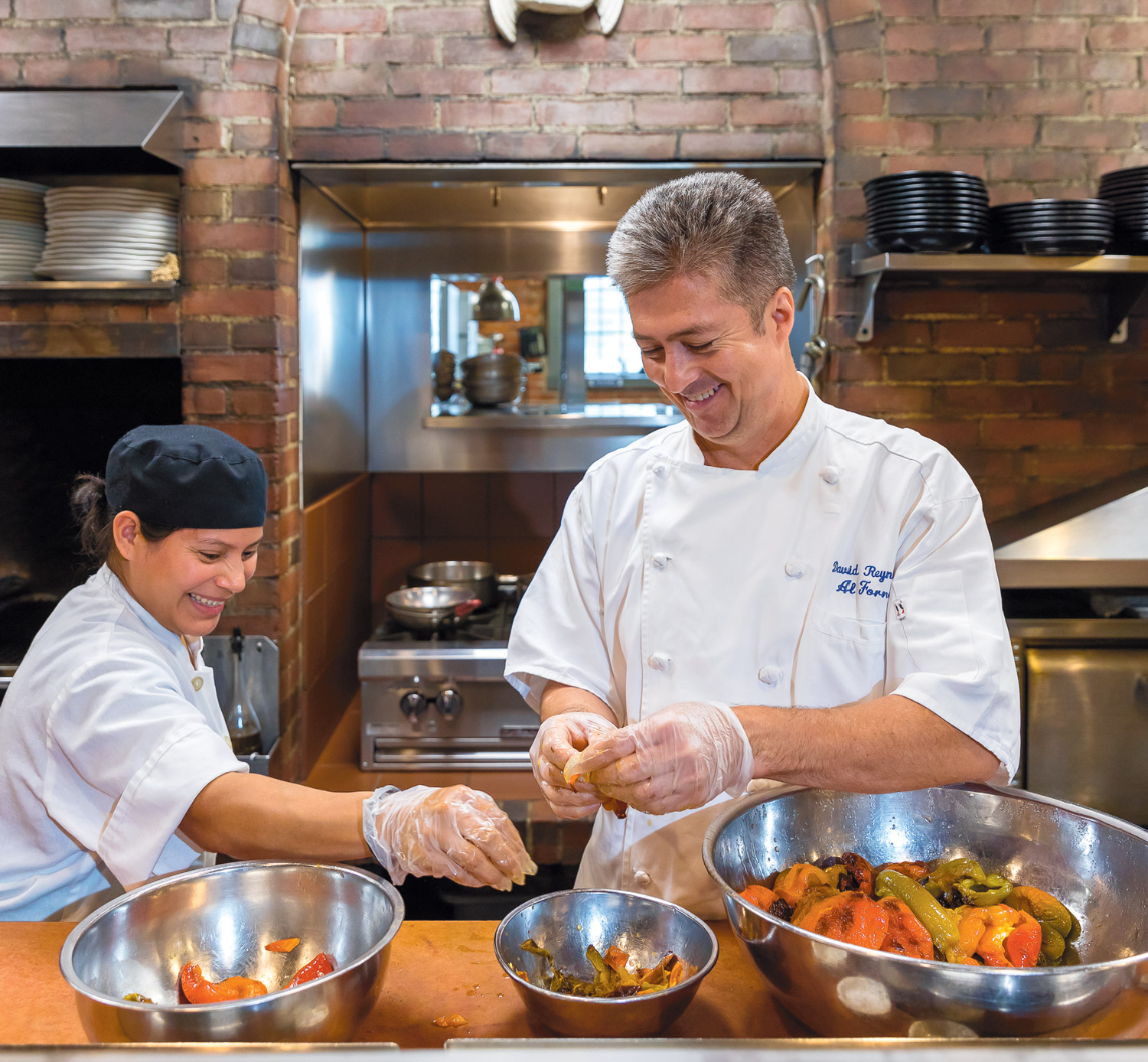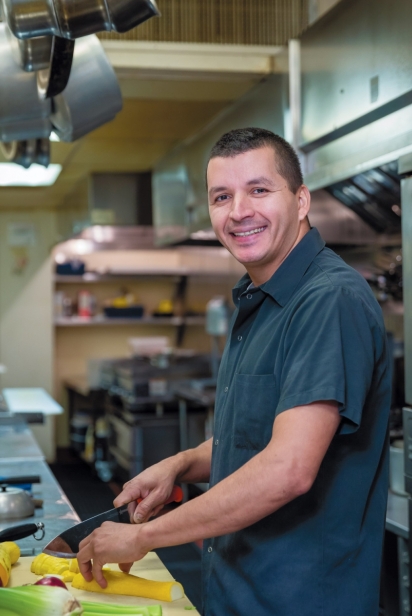Cooking Up the American Dream
Restaurant Workers Share Stories of Immigration

This story is the winner of a Best of Edible Awards 2020.
It’s a Friday morning just after 9 am and the restaurant is empty, save for a crew in the kitchen, their presence evident by the sounds of Spanish wafting down the hall.
In this kitchen, Rafael is prepping for the day, seemingly at ease in an environment where he has worked countless shifts over the better part of 17 years.
This particular kitchen, like many kitchens around Rhode Island and the country, is mostly staffed by native Spanish speakers, notably people born in El Salvador and Guatemala who, at one time, embarked on a long journey to arrive in the smallest state, where they now live and work.
Rafael was born in El Salvador and arrived in Rhode Island in 2002 at the age of 17. He started work as a dishwasher in a Middletown restaurant, advancing to salad prep, a position he held for about two years. During this time, he knew very little English. A few years later, when he took a job as a banquet chef at a Newport hotel, his understanding of English had improved, which made work easier. After the hotel job, he worked at a pizza place, and then another Middletown restaurant. For the past six years he has worked in Newport as a line cook in one popular Newport restaurant in the mornings and another one in the evenings.
“Pretty much since I’ve lived in Newport I’ve been working two jobs,” Rafael said. Five days a week, he works 9 am to 3 pm at one job, and then heads to the other kitchen, where he works from 4 to 10 pm. The two days a week he’s not working are devoted to his young family.
Although these two restaurants are just a half mile apart, their kitchen environments are very different. In one kitchen, everyone speaks Spanish; at the other, everyone speaks English. Rafael doesn’t prefer one over the other, and said the kitchen culture in both restaurants is similar: “You have to have a team—if you don’t have a team, everything is going to fall apart,” he said.
Rafael has about 20 cousins who live in Newport, and they all work in restaurants, too. In many cases, he’s helped them find employment.
“I help so many people, I can’t even remember— friends, family . . . people I don’t even know,” Rafael said. “You come from another country, you don’t know anything about this country . . . [we] got to be a big immigrant family.”
By his estimate, more than 90% of kitchens in Newport are staffed with immigrants. “I think every kitchen in Newport has immigrants in it,” he said.
A NEW LIFE
In Providence, a young man by the name of Nelson also started as a dishwasher, working his way up to supervisor of a popular Providence fast-casual eatery. Like Rafael, he arrived in the United States as a teenager from Central America.
“I told my mom, ‘Hey, Mom, I go to the U.S. I’ll be back in maybe 10 years,’” he said.
Nelson was born in Guatemala and left home at the age of 17 in 2013, embarking on a long, difficult journey across Mexico to the U.S.–Mexico border. Soon after crossing into Texas, he was arrested by the border patrol.
“I tell them, I say, ‘Listen, in Guatemala there is a lot of violence there, there is no money, there is no job . . . I am here because I want to go to school, I want to work for my mom,’” Nelson recalled.
Because he was a minor, Nelson qualified for the Deferred Action for Childhood Arrivals (DACA) program. Border patrol got in touch with his father, who lives in Rhode Island. After a lot of paperwork, Nelson was transferred to a youth refugee shelter in Miami. From there, he was flown to Providence where, six weeks after he left his mother, he reunited with his father, whom he hadn’t seen in nearly 17 years.
Nelson was soon enrolled at Mount Pleasant High School, where he learned English and made some of his best friends, who share similar immigration stories. He also connected with a lawyer who helped him receive a green card through the DACA program.
“It made me cry,” Nelson recalled of that milestone. With his green card, he was able to return home last year. “I went for a month; it was good,” he said. While there, Nelson helped build a house for his mother, whom he calls every week and continues to support financially.
Now 23, Nelson is a third-year student at Rhode Island College studying business. He has dreams of opening his own bar and restaurant, possibly with a focus on Guatemalan cuisine and culture.
Although Providence Mayor Jorge Elorza has declared the capital a “sanctuary city,” essentially a place-based designation meant to defy federal immigration law in favor of protecting residents, this hasn’t prevented Immigration and Customs Enforcement officers, commonly known as “ICE,” from lurking in immigrant neighborhoods. Nelson said ICE officers have been known to ride the RIPTA bus around Providence, and that people who used to go for a beer after work now head straight home, living in a constant fear of deportation. It’s not unheard of, he said, for someone to not show up to work because they were arrested by ICE officers.
“You wake up, and it’s another day, but you don’t know what will happen,” Nelson said. “There is a lot of risk to take, trying to get the American dream, and sometimes it’s not a dream.”
FROM DISHWASHER TO EXECUTIVE CHEF
On a Wednesday afternoon not too far from where Nelson works, David Reynoso is prepping vegetables in the kitchen of Al Forno, where he has worked as the executive chef for 13 years.
Like Rafael and Nelson, Reynoso immigrated to the United States as a teenager, leaving behind all that he knew in search of better opportunities. When he left his home in rural Mexico in 1986, the region had just suffered a devastating earthquake. And so, at the age of 15, he followed in the footsteps of two older brothers and his father, who decades earlier had traveled to the U.S. as part of the Bracero Program, which placed millions of Mexicans in agricultural labor jobs from 1942 to 1964.
He joined his family in Chicago, where he soon got a job as a dishwasher, using the money he earned to pay rent and support family back home. “I grew up kind of fast,” Reynoso said.
A few years later, around the age of 18, Reynoso realized he had a passion for food, and that he wanted to make a career of working in restaurants. “I decided this is what I wanted to do,” he recalled. “For me, it just kind of happened.” He traces the roots of his appreciation for cooking to his rural upbringing and a childhood spent eating food from the land. He has fond memories of fresh tortillas and cheese made from the milk of cows grazing nearby.
“Maybe we all just come from little areas and are passionate about food. Or we just need jobs,” Reynoso said in response to the question of why he thinks so many immigrants work in restaurants. “We’re passionate people, we love food—maybe that’s why we ended up in this industry.”
Reynoso is one of 12 siblings, nearly half of whom live in the U.S. and also work in restaurants, including a sister who has worked at Al Forno for 10 years. He worked his way up from a dishwasher to executive chef, studying Italian cuisine in Italy along the way, something his family initially thought was strange but now understand. He speaks Italian, and oversees a kitchen with workers born in Guatemala, El Salvador, New Jersey and Rhode Island.
“I have cooked many meals,” Reynoso said, noting he’s mostly worked in Italian restaurants, but still cooks Mexican food at home. “A lot of immigrants come here with a desire to succeed—that’s how I came here.”
When asked if he’s noticed a shift in people’s attitudes towards immigrants in recent years, he said yes. There was a time when people didn’t think much about his Mexican origins, but now, with all the talk of a border wall, some people’s attitudes have changed. “People look at us a little differently now,” he admitted.
THE ELEPHANT IN THE KITCHEN
Stephen Silverstein, founder of Not Your Average Joe’s and owner of The Black Whale in New Bedford, Masschusetts, believes there is no restaurant in America that is operating at full capacity, something that is the result of immigration and the legal complications many restaurant owners face in terms of hiring people who do not have proper paperwork.
“It’s not a good topic for the employee or the employer to be talking about,” Silverstein said. “There’s no upside to the conversation.”
The industry is strained for help and needs more workers, he said, noting that immigrants arrive here willing to work long shifts that span nights and weekends, and, by default, end up with restaurant jobs. Like Rafael, Nelson and Reynoso, many of these individuals take jobs as dishwashers because they can manage them despite a language barrier, and are willing to work 60 to 80 hours a week so they can send money back home.
“Most American kids think they’re above starting as a dishwasher,” Silverstein said. “I think we need to give honorable people a chance to work. We need [immigrant workers].
“There’s not a restaurant in America that doesn’t need help,” he added, adamantly. “Americans are addicted to dining out, and the kitchens they want to eat from are understaffed . . . what we’re saying is there’s not enough people to do these jobs.”
When asked what he considers the best solution to this problem, Silverstein responded: “Governmental action to allow honorable people that have passed the scrutiny to come to America.”
The National Restaurant Association takes a similar stance. The advocacy association, which represents more than 500,000 restaurant businesses, posted a letter on its website in early January 2019 stating its views on immigration reform, which include: “border security, a path to legalization, a viable essential worker program, and an efficient federal employment verification program.
“More than 11 million undocumented individuals are living and working in the United States. Many are paying taxes and contributing to the economy and their communities. Numerous polls show that the public strongly supports a clear path to legalization for these workers. Restaurants support this too,” reads the Association’s statement. “We support a new program that would legally match willing workers with willing employers— a viable year-round temporary worker visa program for the service sector.”
Whether such a program will ever be enacted is still to be determined. In the meantime, young people like Nelson continue to leave home, their futures unknown, and undertake a dangerous journey to arrive in the United States, where they do not speak the language but have hopes of living out a distinctly American dream: working their way up to a life of comfort and stability, for them and their families. Achieving this dream is not easy or always attainable, but it’s very much a part of the immigrant experience and, by default, the restaurant experience.
“I do my best,” Nelson said. “At the end of the day, it’s for my benefit; it’s for me.”





